Comprehensive Guide to Garden Maintenance in Covent Garden
Introduction to Garden Maintenance
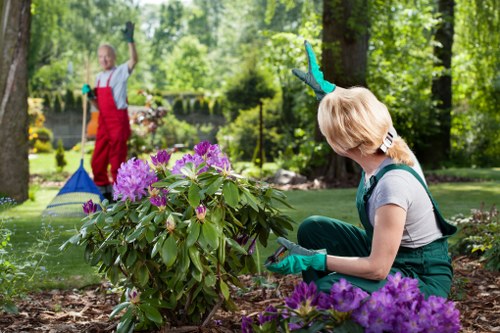
Maintaining a garden in Covent Garden requires a blend of expertise, dedication, and an understanding of the unique environmental factors that influence plant health. Whether you're a seasoned gardener or a novice looking to enhance your outdoor space, effective garden maintenance ensures that your garden remains vibrant and thriving throughout the year.
In this guide, we'll explore the essential aspects of garden maintenance specific to Covent Garden, providing you with practical tips and strategies to keep your garden in top shape. From choosing the right plants to regular upkeep routines, you'll find everything you need to create and sustain a beautiful garden.
Understanding the local climate and soil conditions is crucial for selecting the appropriate plants and implementing maintenance practices that suit your garden's specific needs.
Understanding Covent Garden's Climate
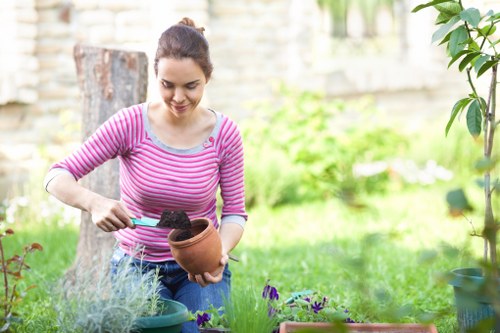
Covent Garden, located in the heart of London, experiences a temperate maritime climate characterized by mild summers and cool winters. The area receives moderate rainfall throughout the year, which plays a significant role in garden maintenance.
To thrive in Covent Garden's climate, it's essential to select plants that are resilient to both the occasional cold snaps and the relatively warm summertime temperatures. Additionally, understanding the seasonal variations can help you plan your gardening activities more effectively.
Implementing proper watering schedules is vital, as the humidity levels can affect soil moisture. Ensuring adequate drainage can prevent waterlogging, which is detrimental to many plant species.
Soil Preparation and Maintenance
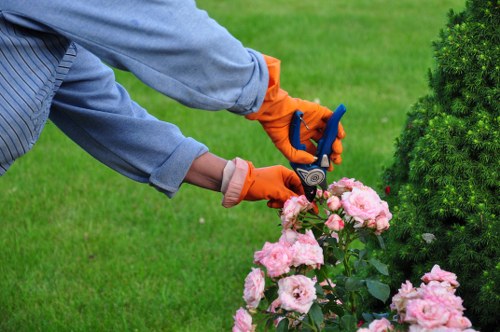
The foundation of any healthy garden lies in its soil. Covent Garden's soil composition can vary, but it generally tends to be clayey with good nutrient content. Conducting a soil test is recommended to determine its pH level and nutrient profile.
Based on the soil test results, you may need to amend the soil to create an optimal environment for plant growth. Adding organic matter such as compost or well-rotted manure can improve soil structure, enhance fertility, and promote beneficial microbial activity.
Regularly aerating the soil helps prevent compaction, allowing roots to penetrate deeply and access essential nutrients and water. Mulching is another effective practice that conserves moisture, suppresses weeds, and regulates soil temperature.
Plant Selection for Covent Garden Gardens
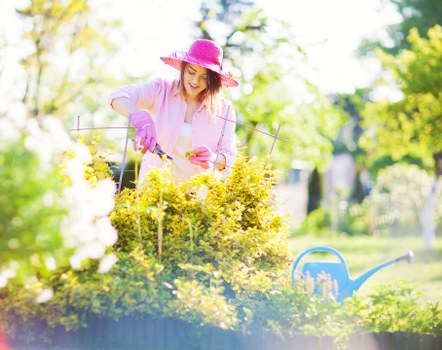
Selecting the right plants is a cornerstone of successful garden maintenance. In Covent Garden, it's important to choose species that are well-suited to the local climate and soil conditions.
Consider incorporating a mix of native and ornamental plants to create a diverse and resilient garden. Native plants are particularly advantageous as they are adapted to the local environment, requiring less water and maintenance while supporting local wildlife.
Perennials, shrubs, and trees can provide structure and long-term beauty to your garden. Additionally, incorporating seasonal flowers ensures continuous color and interest throughout the year.
Regular Maintenance Tasks
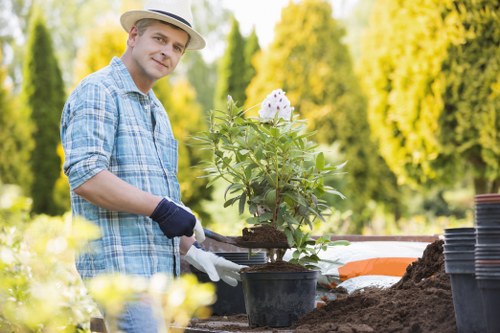
Consistent maintenance is key to preserving the health and appearance of your garden. Here are some essential tasks to incorporate into your routine:
- Pruning: Regularly trim and shape plants to encourage healthy growth and prevent overgrowth.
- Weeding: Remove unwanted weeds to reduce competition for nutrients and prevent them from spreading.
- Watering: Adjust watering schedules based on seasonal changes and plant requirements.
- Fertilizing: Provide necessary nutrients through appropriate fertilizers to promote vigorous plant growth.
- Pest Management: Monitor for pests and diseases, implementing organic or chemical controls as needed.
By diligently performing these tasks, you ensure that your garden remains healthy, aesthetically pleasing, and free from common issues that can compromise plant vitality.
Seasonal Gardening Tips
Adapting your garden maintenance practices to the changing seasons can significantly enhance the health and beauty of your garden in Covent Garden.
Spring
Spring is an ideal time for planting new flowers and shrubs, as well as preparing your garden for the growing season. Focus on:
- Removing winter debris and dead plant material.
- Planting early-blooming flowers like tulips and daffodils.
- Applying mulch to conserve moisture and suppress weeds.
Summer
During the summer months, maintaining adequate moisture levels and protecting plants from excessive heat is essential. Key activities include:
- Regular watering, preferably in the early morning or late evening.
- Pruning to improve air circulation and reduce disease risk.
- Harvesting fruits and vegetables to encourage continued production.
Fall and Winter Maintenance
Fall
As temperatures begin to drop, focus on preparing your garden for the cooler months. Important tasks include:
- Planting autumn-blooming flowers such as chrysanthemums.
- Clearing fallen leaves to prevent mold and pests.
- Protecting sensitive plants with mulch or covers.
Winter
Winter maintenance involves ensuring that your garden remains protected from frost and freezing temperatures. Consider the following:
- Pruning bare woody plants to prevent damage.
- Wrapping delicate plants or containers to insulate them.
- Planning for the next gardening season by reviewing successes and areas for improvement.
By addressing these seasonal needs, you can extend the lifespan of your plants and prepare your garden for a prosperous year ahead.
Professional Garden Maintenance Services
While many aspects of garden maintenance can be handled individually, enlisting the help of professional garden maintenance services in Covent Garden can provide expert care and ensure optimal results.
- Expertise: Professionals bring extensive knowledge and experience, ensuring that your garden receives the best possible care.
- Efficiency: Professional services can complete maintenance tasks more quickly and effectively, saving you time and effort.
- Customized Care: Tailored maintenance plans address the specific needs of your garden, promoting healthy growth and long-term beauty.
Investing in professional garden maintenance services can transform your outdoor space, making it a source of pride and enjoyment.
Eco-Friendly Gardening Practices
Implementing eco-friendly practices in your garden not only benefits the environment but also enhances the sustainability and health of your garden in Covent Garden.
- Composting: Recycle kitchen scraps and garden waste to create nutrient-rich compost, reducing landfill waste and improving soil quality.
- Rainwater Harvesting: Collect and utilize rainwater for irrigation, conserving water and reducing utility bills.
- Organic Pest Control: Use natural methods such as beneficial insects and organic sprays to manage pests without harming the ecosystem.
- Native Planting: Incorporate native species that require less water and are more resistant to local pests and diseases.
Adopting these sustainable practices contributes to a healthier environment and a more resilient garden.
Tools and Equipment for Effective Maintenance
Essential Tools
- Pruners and Shears: For precise trimming and shaping of plants.
- Garden Fork: Ideal for aerating soil and turning compost.
- Spade and Shovel: Necessary for digging, planting, and transplanting.
- Rakes: Useful for collecting leaves and leveling soil.
- Irrigation Systems: Efficient watering solutions to maintain consistent moisture levels.
Maintenance Tips
Regularly maintaining your gardening tools ensures their longevity and performance. Clean tools after each use, oil moving parts to prevent rust, and store them in a dry place.
Investing in high-quality tools can make garden maintenance tasks easier and more enjoyable, contributing to the overall well-being of your garden.
Designing Your Garden Layout
A well-thought-out garden layout enhances both the functionality and aesthetic appeal of your outdoor space in Covent Garden.
Planning the Layout
- Assess the Space: Consider the size of your garden, sunlight exposure, and existing structures.
- Define Zones: Create distinct areas for planting, seating, and other activities.
- Pathways: Incorporate paths to facilitate easy movement and access to different garden sections.
Choosing Plant Arrangements
Strategically arranging plants based on their height, color, and blooming seasons can create a harmonious and visually appealing garden.
Layering plants from tallest to shortest, using color contrasts, and ensuring a mix of textures can add depth and interest to your garden design.
Lighting and Irrigation Solutions
Garden Lighting
Proper lighting enhances the beauty of your garden while extending its usability into the evening hours. Consider the following lighting options:
- Path Lights: Illuminate walkways for safety and aesthetic appeal.
- Spotlights: Highlight key features such as trees, sculptures, or water features.
- String Lights: Create a charming ambiance for outdoor gatherings.
Irrigation Systems
Efficient irrigation is crucial for maintaining garden health, especially during dry periods. Explore different irrigation solutions:
- Drip Irrigation: Provides targeted water delivery directly to plant roots, conserving water.
- Sprinkler Systems: Suitable for lawns and larger planting areas, ensuring even coverage.
- Automated Timers: Schedule watering times to optimize water usage and reduce manual effort.
Implementing the right lighting and irrigation solutions can significantly enhance the functionality and appeal of your garden.
Dealing with Common Garden Challenges
Pest Control
Pests can pose a significant threat to garden health. Implementing integrated pest management (IPM) strategies can help manage pest populations effectively:
- Regular Monitoring: Inspect plants frequently to detect early signs of pest infestations.
- Natural Predators: Encourage beneficial insects like ladybugs and praying mantises that prey on common garden pests.
- Organic Treatments: Use neem oil, insecticidal soaps, or homemade remedies to control pests without harming the environment.
Disease Prevention
Plant diseases can spread rapidly if not addressed promptly. Preventative measures include:
- Proper Spacing: Ensure adequate airflow between plants to reduce humidity and prevent fungal growth.
- Sanitation: Remove and dispose of diseased plant material to prevent the spread of pathogens.
- Resistant Varieties: Choose plant varieties that are resistant to common diseases in Covent Garden.
Weed Management
Weeds compete with desirable plants for nutrients, water, and sunlight. Effective weed management strategies include:
- Mulching: Apply a thick layer of mulch to suppress weed growth and retain soil moisture.
- Hand Weeding: Regularly remove weeds by hand to prevent them from establishing.
- Herbicides: Use selective herbicides to target specific weed species without harming your plants.
Addressing these common challenges ensures a healthy and flourishing garden environment.
Enhancing Garden Aesthetics
Incorporating Hardscapes
Hardscape elements like patios, pergolas, and garden furniture contribute to the functionality and beauty of your garden.
- Patios: Create a space for outdoor dining and relaxation.
- Pergolas: Provide shade and a framework for climbing plants.
- Water Features: Add visual interest and a soothing ambiance with fountains or ponds.
Using Decorative Elements
Decorative elements such as garden sculptures, ornamental pots, and lighting fixtures enhance the visual appeal and personal style of your garden.
Choosing elements that complement your garden's theme and color palette can create a cohesive and inviting outdoor space.
Sustainable Garden Practices
Composting
Composting transforms organic waste into valuable fertilizer, enriching your soil and reducing landfill waste.
- Green Materials: Include vegetable scraps, coffee grounds, and fresh plant trimmings.
- Brown Materials: Add dry leaves, straw, and shredded paper to balance moisture levels.
- Maintenance: Turn the compost regularly to aerate and accelerate decomposition.
Rainwater Harvesting
Collecting rainwater is an eco-friendly way to provide irrigation for your garden, reducing reliance on municipal water sources.
- Rain Barrels: Install rain barrels to capture runoff from rooftops.
- Gutters: Ensure gutters are clean and properly directing water into the collection system.
- Usage: Use harvested rainwater for watering plants, filling ponds, and cleaning tools.
Implementing these sustainable practices promotes environmental stewardship and enhances the resilience of your garden.
Conclusion and Call-to-Action
Maintaining a garden in Covent Garden involves a combination of careful planning, regular upkeep, and the adoption of sustainable practices. By understanding the local climate, preparing the soil effectively, selecting the right plants, and addressing common challenges, you can create a vibrant and enduring garden.
Whether you choose to handle garden maintenance yourself or enlist the expertise of professional services, the rewards of a beautiful and healthy garden are well worth the effort.
Ready to Transform Your Garden?
Contact us today to learn more about our comprehensive garden maintenance services in Covent Garden and take the first step towards a stunning outdoor space.
